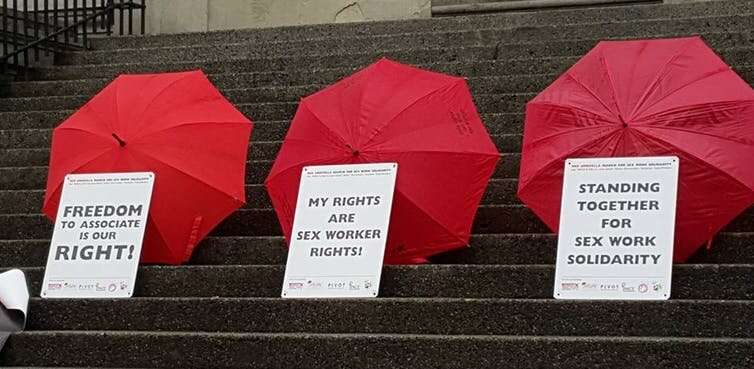Sex worker rights: Hysteria, surveillance and threats to fundamental freedoms

2:00 a.m. The phone rang, abruptly awakening me. It was the hotel night clerk calling to tell me that members of the Montréal Police Service were downstairs and wanting to search my room. When I asked why, I was told there was a report of a missing youth being held in the hotel. Knowing I couldn't refuse without negative consequences, I reluctantly agreed.
This happened to one of us—Kerry Porth, sex worker rights activist, educator and scholar. Along with Genevieve Fuji Johnson—professor of political science at Simon Fraser University and co-author of this article—Kerry was in Montréal to attend the . Our paper on harm reduction in sex work was well received by a small but interested audience. Until this raid on Kerry's room, never did it cross our minds that our work would attract the attention of the law.
In May 2019, the Montréal Police Service launched RADAR, an anti-trafficking program that . RADAR is similar to other initiatives implemented across North America.
For several years, industry associations such as the Ontario Restaurant Hotel and Motel Association and the American Hotel and Lodging Association have been partnering anti-trafficking organizations like Polaris and ECPAT-U.S. along with police departments. These initiatives include providing hotel employees —from global hotel chains like the Marriott, Hilton, Hyatt and others —. Indicators include guests having multiple computers and phones, large amounts of cash, and lots of alcohol, condoms, lube and lingerie. Other signs include: refusing cleaning services; leaving minors in the room; infrequently leaving the room; frequently using the "Do not Disturb" sign; . Wearing large hats and sunglasses is . Children's items and .
A serious issue with these indicators is that, like claims linking an increase in trafficking to major sports events, . They , and they empower amateur agents of the state to report this behaviour to state authorities. The consequences of these programs are far-reaching.
Programs impede safety and freedom
These programs may make it more difficult for real victims of both sexual exploitation and sex trafficking to come forward, . Those who have power over them may find more ways of keeping them hidden from well-publicized efforts to detect them. Moreover, by funding these programs, valuable resources are diverted from addressing deeper causes of trafficking and, im/migrants who are either and .
Captured by the excessively broad net of initiatives are consenting adults engaging in transactional sex. These programs , more and less likely to . These initiatives also threaten the rights and freedoms of citizens —perhaps especially those of us who are racialized.
Threats include those to . As the raid on Kerry's room suggests, these initiatives may also pose threats to academic freedom.
The incident has caused us to think more carefully about hiding from sight any research materials we may have with us when we travel. We believe it was those research materials —along with a stuffed animal, Sheepy, who accompanies Kerry on overnight trips away from home —may have been what triggered the report to the Montréal police.
Gaining the trust of sex workers
Ultimately, these programs threaten the very concept of citizenship. These anti-trafficking initiatives represent a shift from an ideal of citizenship in which members of a political community have a responsibility to be critical of the state and to keep a vigilant eye on its exercise of power. The ideal citizen underlying programs such as RADAR is one in which she becomes an agent of the state blindly implementing its agenda.
Human trafficking of any kind is a serious concern. However, concerns about sex trafficking often belie a powerful moralism that resists evidence and logic. This moralism feeds certain anti-trafficking campaigns that are more harmful than helpful, especially when those campaigns involve harnessing the surveillance powers of an archipelago of hotels, taxi companies, and airlines.
If we really want to combat sexual exploitation and trafficking —and we do —a critical first step is . People engage in sex work for a wide range of reasons including, for some, a lack of other employment options. Sometimes sex workers will travel across jurisdictions to work. Sex work occurring indoors —in condos or hotel rooms —is . None of these facts necessarily reduce sex work to sex exploitation or trafficking. Anti-trafficking policies and programs need to be .
is another crucial step to combat sexual exploitation and trafficking. Once decriminalized, prostitution can be governed by the same types of labour laws in other areas and sex workers can receive the same protections as workers in other areas.
Municipal governments, including police departments, need to work hard to gain the trust of sex workers and their advocacy and support organizations. These advocacy groups are among the best positioned to identify victims of either sexual exploitation or sex trafficking and to refer them to trusted programs that can enable them to exit the trade should they choose to do so. We believe that trafficking cannot be addressed without these steps, and certainly not by amateur agents of the state marking off trafficking indicator checklists.
Provided by The Conversation
This article is republished from under a Creative Commons license. Read the .![]()



















